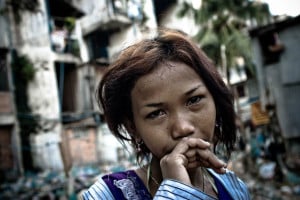By: Charmaine Santos
Many people assume that women in the sex industry are “forced,” but this might not be entirely true according to an interview Voice of America conducted with journalist, writer, and artist Anne Elizabeth Moore. Women in Cambodia have very few employment opportunities except in the industries of garment manufacturing and sex work.
Moore reveals during the interview that women often resort to the garment or sex industry because the Cambodian government is not necessarily looking to expand other employment industries for women, therefore presenting these industries as a place of forced labor. Here in the United States we often think forced labor for women to be sex trafficking, however, many women in Cambodia do not claim that they were trafficked but claim that they just simply work for the industry. Therefore the thought of everyone working in the sex industry is forced, is not accurate. Unfortunately, women in both industries are extremely underpaid.
When the question of what the United States can do to break the cycle of forced labor and make sure that brands are aware of forced labor in the garment factories, Moore replied that though there is low pay in both industries, the problem is not necessarily with the clothing brands. Employed Cambodian women get low pay for any position they can hold since the Cambodian government is hesitant to open up new employment opportunities for women. So it is not so much a consumer issue, though creating brand awareness is helpful. The issue is also based on policy, and until countries like Cambodia provide a wider range of options for women’s employment, women’s labor in third world countries will continue to be an issue. It is therefore the United States’ job to support poverty elimination policy worldwide.
Moore finishes the interview by saying that questions regarding poverty are more pressing than questions regarding morality. She explains that to implement an effective poverty-elimination strategy, we should focus on getting people out of the system of economic oppression. Moore has also discovered through interviewing women in the sex industry that some women actually enjoy working in the industry, but even though it is not the best opportunity, it is the only paying one. Employment opportunities must expand worldwide before we give women the option to escape the industry they were “trapped” into in the first place.
—
Charmaine Santos is a sophomore at the University of San Francisco pursuing a Bachelors of Science in Biology as well as minors in Chemistry and Health Studies. She volunteers alongside UCSF medical students at a student-run homeless clinic in San Francisco and is also an active volunteer with Operation Access. Charmaine is also a Social Media Assistant at Cancer InCytes Magazine.
—
Reference:
Soksreinith, Ten. (2015, April 21). “Author Looks at Forced Labor in Cambodia’s Sex and Garment Industries.” Voice of America. Retrieved May 5, 2015 from http://www.voacambodia.com/content/author-looks-at-forced-labor-in-cambodias-sex-and-garment-industries/2726966.html
Photo Credit: http://savecambodia.org/2015/04/06/girls-for-sale-inside-cambodian-trafficking/
